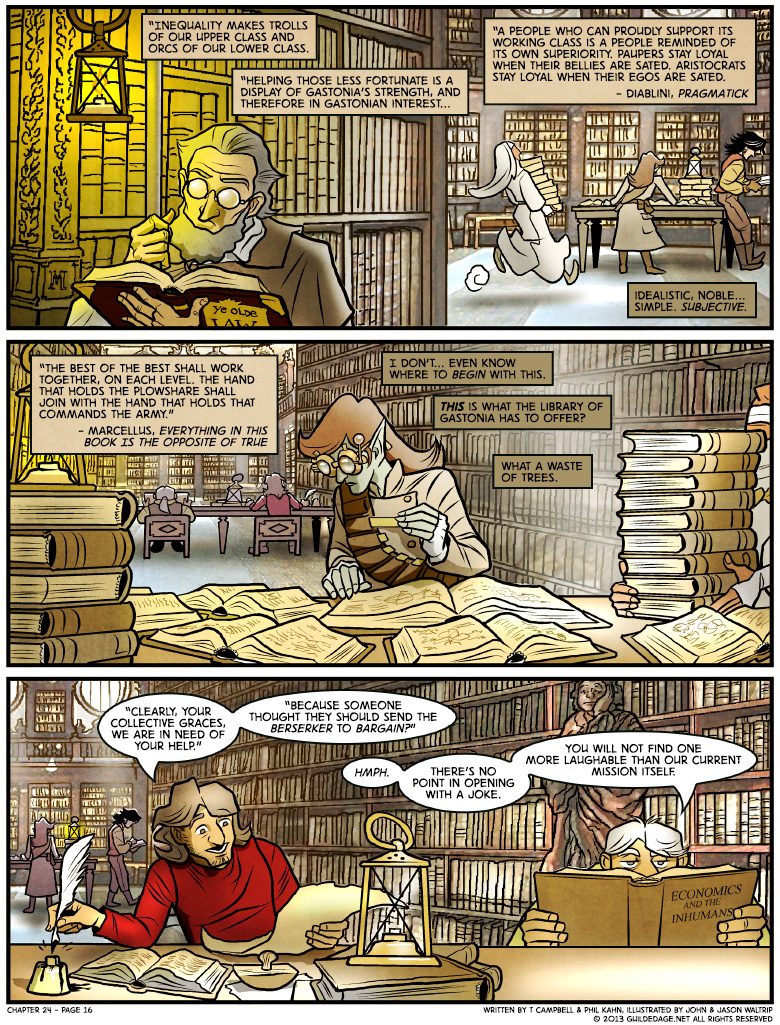Annotated 24-16
 Everything in this Book Is the Opposite of True does remind me a little of Praise of Folly now, but I’d missed that one in my earlier education. I think Kur’Ik doesn’t have the right cultural grounding to appreciate it. Diablini seems more like a little bit Aristotle and a little bit Machiavelli. His first line is modeled on a quote from Matthew Arnold, “seasoned” with Gastonian speciesism.
Everything in this Book Is the Opposite of True does remind me a little of Praise of Folly now, but I’d missed that one in my earlier education. I think Kur’Ik doesn’t have the right cultural grounding to appreciate it. Diablini seems more like a little bit Aristotle and a little bit Machiavelli. His first line is modeled on a quote from Matthew Arnold, “seasoned” with Gastonian speciesism.
Some other quotes I cranked out for Phil to use or, as he did, to discard:
“If some must be miserable, let all be miserable!”
–Parvus the Serf, The Street-Sweeper’s Manifesto
“Be generous, or be roadkill!”
–Anonoymous highwayman slogan co-opted by the wildly unsuccessful trader Charles the Thin, whose desire to be liked burned away his fortune in record time, mentioned disparagingly in The Macroeconomicon
“In Gnometown, the guardsman is a working-class hero. In Gastonia, the guardsman is a working-class traitor.”
–Guard Chief Garrier, quoted by Historian Herodon, Cross-Indexed Ruminations on Security [note: this is based on a real-life quote from Martin Amis]
“The strongest dividing force within and between nations is, has been, and ever will be the unequal distribution of property.”
–Melgar III, son of Gror, a warrior-king who joined Gastonia voluntarily and is widely considered one of its greatest statesmen, speech quoted in The Governator’s Manual [quote based loosely on James Madison’s The Federalist]











The statue in panel 3 makes me chuckle. I always enjoy background effects like that.
Rochester!
Arnold joins forces with Melgar III and Jonas Ray to write a series of essays defending the new Gastonian Constitution, entitled The Governator’s Manual. The plan was to write a total of twenty-five essays, the work divided evenly among the three men. In the end, they wrote eighty-five essays, in the span of six months. Jonas Ray got sick after writing five. Melgar III wrote twenty-nine. Unterlangenegger wrote the other fifty-one!
But who did he duel?
Wow, Macroeconomicon is such a good book name.
Able to conjure the most ancient and obscure of arcane stonks.
“Join with the hand that holds that commands the army” is a woopsy, isn’t it?
Given that Kur’Ik states she does not know where to begin with this book, it might be an intentional example.
How early on in the series did you decide/know that Lectrus was going to be a traitor? Was he always set up as one, or was it a late decision?
It was later on. We did not know it when we wrote this scene.
How weird is it that they think the rich should be **supporting** the WORKING class?
And the comment on that is (idealistic, noble…)
I mean, maybe the rich should just stop stealing the product of their labor instead?
Like, who is actually supporting whom, there?
I always liked the little touch of Gravedust calling back to his impromptu “comedy” routine early in the series, here. It reminds us that, stoic as he can be, he has a powerful sense of irony and an even subtler sense of humor.